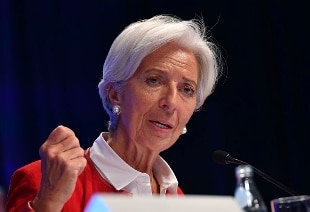- Draghi leaves ECB, Lagarde takes his place. The outgoing governor: we need more Europe
- Lagarde: the United States risks losing their world leadership
Share
22 November 2019The uncertainties affecting the global economy "have proved more persistent than expected, and this is clearly having an impact on the euro area". The president of the ECB, Christine Lagarde, asserted that managing this situation "will certainly not be easy", but if it is done "in the right way it can also be an opportunity". And speaking at the Finance week in Frankfurt, the new president quoted Francis of Assisi: "Begin by doing what is necessary, then what is possible. And suddenly - the saint said - you will be surprised to do the impossible" ."The ECB's accommodating policy - he said - was a fundamental factor in boosting domestic demand during the recovery and this monetary policy position remains in effect". "As indicated in the ECB's forward guidance - he added - monetary policy will continue to support the economy and respond to future risks in line with our price stability mandate. And we will constantly monitor the side effects of our policies".
"Strengthening domestic demand, as countries with current account surpluses can do," can protect jobs when global growth stops ". Lagarde went on to explain that this happens "because domestic demand is more linked to services - which require more work - while external demand is more tied to production, which requires less work".
This process - he adds - today is taking place in the euro area: the resilience of services is the main reason why employment has not yet been influenced by the global slowdown in production ". Moreover, highlights the Lagarde, "there is also a second advantage in strengthening the domestic economy, and that is that this facilitates the rebalancing" between the different countries of the Eurozone. "The countries in surplus tend to grow faster than the world economy during times of global recovery, but also to contract more sharply during periods of global recession, while for countries in deficit, it is the opposite," he concludes.

